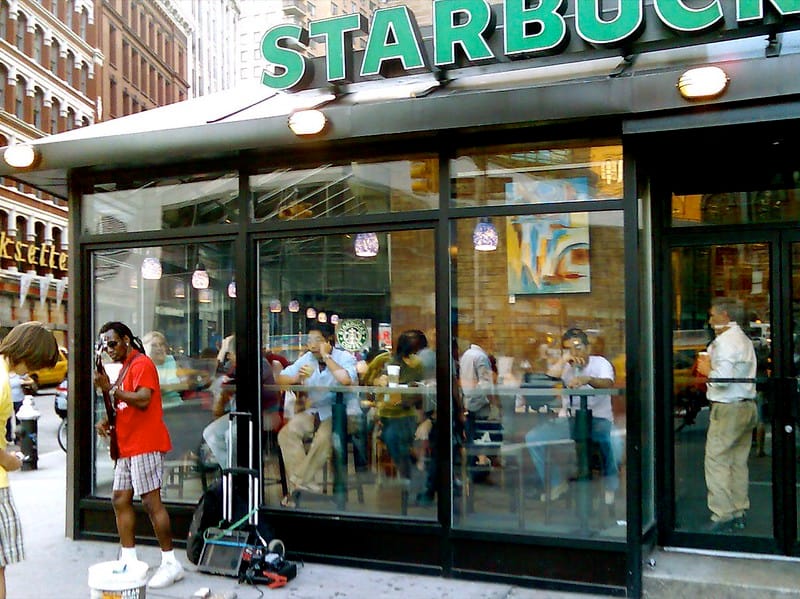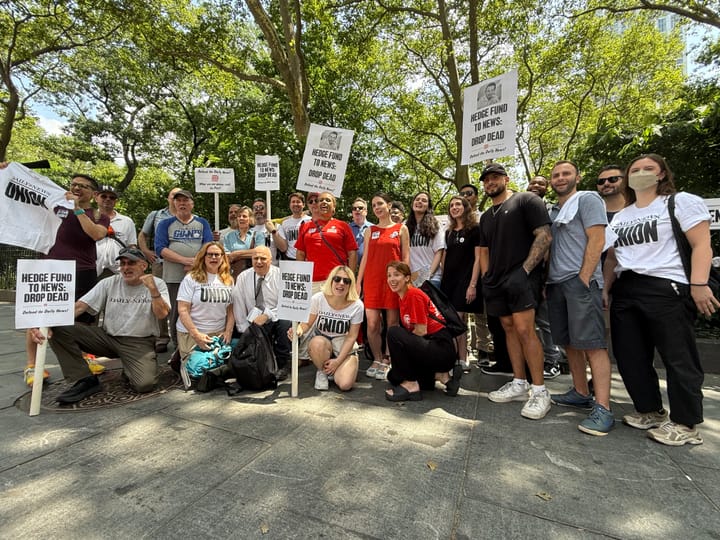The Astor Place Starbucks closed; was it union beef?
The longtime lower Manhattan Starbucks is one of many recently-unionized shops that corporate has given the axe.

Earlier this week, news started whipping around the local news internet that after nearly 30 years, the Astor Place Starbucks would be closing. Initially, the cause was reported as a rent hike, leading to obvious questions about how rent could get so expensive that even literal Starbucks can’t afford it — as well as questions about why so many New Yorkers found themselves sentimental about said literal Starbucks.
It’s a classic case of a corporate giant sticking around long enough to go from “symbol of all that’s wrong with the world” to “well-liked neighborhood guy” (see also: Barnes and Noble). When Starbucks moved onto Astor place in 1995, it replaced beloved longtime 24/7 diner the Riviera cafe, and became a symbol of the neighborhood gentrifying and losing its edge. Since then, though, it’s logged enough years as a convenient meet-up spot, place to get work done, and free bathroom that a lot of people are sincerely sad to see the place go.
But the company seems to have pulled the plug themselves, rather than being driven out by high rents they can surely still afford. Since the announcement, the owners of the Starbucks building, ASG Group, have issued a statement saying that they had not, in fact, raised the rent, and theories have emerged about a far more sinister reason for the store’s closure: the fact that its employees were unionized.
Update on the famous East Village Starbucks: It turns out that their landlord offered a lease extension for them to stay at *the exact same rent* but they didn't accept.
— Asad أسد 🗽🍎 (@AsadFromNYC) July 30, 2024
So the management lied about a rent hike. They left because the staff unionized. https://t.co/i1A9bGfvoF
Workers at the Astor Place Starbucks location won their union vote back in 2022, and have since been part of the ongoing bargaining process between Workers United and Starbucks. And it’s no secret that as more of their stores unionize, Starbucks has been more than happy to engage in aggressive, even illegal union busting, such as firing pro-union employees and yes, shuttering unionized locations so frequently that the National Labor Relations Board issued a complaint about it last December.
As of June 30, the unionized Starbucks location on North 7th Street in Williamsburg has also been shut down, per Greenpointers.
All that said, things at Astor Place don’t seem to have gotten openly contentious between the company and the union thus far. In a statement, Workers United told The Groove that they’ve been “able to engage in bargaining with Starbucks to secure positions [for former Astor Place employees] within their availability at stores of their preference.”
Unsurprisingly, Starbucks has declined to elaborate publicly on the reason for the shop’s closure, though a rep did point out the three other store locations in close proximity to the Astor Place one — a thing people have been making jokes about for years — and told us in a statement, “We continually evaluate our store portfolio, using various criteria to ensure we are meeting the needs of our customers.” They also said they apply the same evaluation criteria to “both union-represented and non-union stores.”
Whatever the true backstory here, it’s a prime example of a particularly sticky labor conundrum: lots of union-busting is illegal, sure, but what are you supposed to do when the boss just closes the damn shop altogether?
It’s an issue close to our hearts at Team Groove; back in 2017, billionaire shithead Joe Ricketts abruptly shut down DNAinfo and Gothamist just a week after workers at the sites had voted to unionize. And he didn’t just shut down the New York news branches of his outlets — he closed everything, including sites in cities like Chicago and San Francisco, none of which had been involved in the union vote.
This is because of a Supreme Court ruling from 1965 which found that if you fully close your entire business, that’s not considered illegal union-busting, even if it’s specifically retaliatory, as it was in Ricketts’ case. Unfortunately for our very own Dave, he happened to be working at Gothamist at the time.
“He wouldn’t have been able to only shut down Gothamist and DNAinfo,” Dave said. “But if you fold entirely, the government can’t force you to keep your business going.” (It’s worth reiterating here that for this same reason, this loophole doesn’t apply with Starbucks — Astor Place and other locations might be closed, but the larger company is obviously still very much in business.)
In the case of the DNAinfo and Gothamist workers, they at least benefited from some New York-specific labor protections that more people should know about. New York State has something called the Worker Adjustment and Retraining Notification (WARN) Act, which requires that companies of a certain size give employees 90 days notice for things like plant closures, relocations or mass layoffs. Companies that fail to comply face fines, and more importantly, the requirement to give workers back wages and benefits.
Because of the lack of notice before the closure, “We got paid for three months, with benefits and all that,” Dave said. This is valuable information to keep in the pocket if your boss ever abruptly decides to shut things down, and as with all things, collective bargaining makes you way more likely to get what you’re owed fair and square; don’t let the specter of a few union-busting CEOs scare you into thinking otherwise.
“You need to know the risk is there, but I think whatever you’re trying to fix or improve by forming a union isn’t likely to get any better if you just wait for your boss to be cool,” as Dave puts it.
As for the 17 employees of the Astor Place shop, it sounds like at least a good number of them will in fact be relocated to other Starbucks locations, if that’s something they want. (This all happened three days ago, so negotiations are still ongoing.) Which is all well and good — but what will happen if those stores decide to unionize, too?




Comments ()